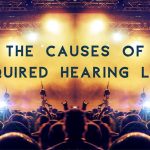It has been proven that as we age, we are likely to develop hearing loss. Though there are many causes of hearing loss, the most common is age-related hearing loss, or presbycusis. Presbycusis is due to the death of sensory hair cells of the inner ear that, once they die, cannot grow back. It is not yet known why they slowly die.
The effects of not treating age-related hearing loss can range from social isolation to depression and possibly dementia. There have been many studies working to link the effects of untreated hearing loss to various conditions, including mental fatigue, depression, and even dementia. As hearing loss greatly affects brain function, researchers are diligent in finding these connections and encouraging people to care for their hearing health.
Heed the Signs
Often, there is not a clear sign or indicator that you may have a hearing loss; the sense gradually declines. You may not realize that you have a hearing loss until a friend or loved one talks to you about habits you have begun to display: asking people to repeat themselves, listening to the television or music at very high volumes, or isolating yourself at social gatherings. And as hearing loss progresses, it becomes more obvious and action should not be delayed.
There are also cases where an isolated incident is the cause of disabling hearing loss. It can be a loud explosion or gunshot of which you are in close range, extreme head trauma, and others. These are less common than age-related hearing loss, but require attention from a hearing healthcare professional nonetheless.
At the first sign of hearing loss, consult your doctor to refer you to an audiologist for a hearing exam and through diagnosis of your results. You can also search online to find an audiologist (a “hearing doctor,” usually with one or more doctorate degrees in audiology, who specializes in diagnosing and treating hearing loss and balance disorders), an otolaryngologist (a medical physician who specializes in treating diseases of the ear, nose, and throat—they are often referred to as an “ear doctor” or ENT), or a Board Certified Hearing Instrument Specialist (BC-HIS).
Side Effects and Risks of Untreated Hearing Loss
Hearing is not a job solely for the ears: we also hear with our brains. Noise collected in the ear canal is turned into electrical signals that are then carried along the auditory nerve to the brain. That information is translated into recognizable sound and speech. When hearing is impaired, or any part of the system of hearing organs is damaged, the brain receives only part of the information. During conversation, for instance, it has to work harder fill in gaps, using context clues or reading body language to get all of the missing information.
When the brain is working this hard on hearing, energy and focus is drawn away from other tasks like decision-making and memory. This can lead to mental fatigue and cause you to feel more tired than you would normally be after a day of work or socializing. It can also eventually lead to isolating yourself from your social circles and avoiding gatherings where you would have to focus on multiple people speaking at once. When the brain is inactive and not stimulated for extended periods of time, social isolation acts as a precursor to cognitive decline, putting you at risk for Alzheimer’s and dementia.
How Hearing Aids Can Help
If after having your hearing tested, your audiologist thinks hearing aids might be the best option, you can have them fitted to your needs. Some hearing aids, like the Phonak Audeo B can be fitted to reduce environmental noise, while others help you hear high pitched sounds and voices, or whatever your specifications may be. They can essentially help reduce the strain of listening and concentrating taken on by the brain when a hearing loss is present.
The advances in technology have made hearing aids more adaptable to our modern needs than ever. Many, like the Starkey Halo, are equipped with Bluetooth technology that can connect directly to your smartphone or television. Some have multidirectional microphones that help direct sound to the ear even better. These features, and more, can be explained by your hearing healthcare professional during your hearing aid fitting. Once you discuss your lifestyle and hearing needs with your doctor, the two of you can make the best decision for your hearing device.






